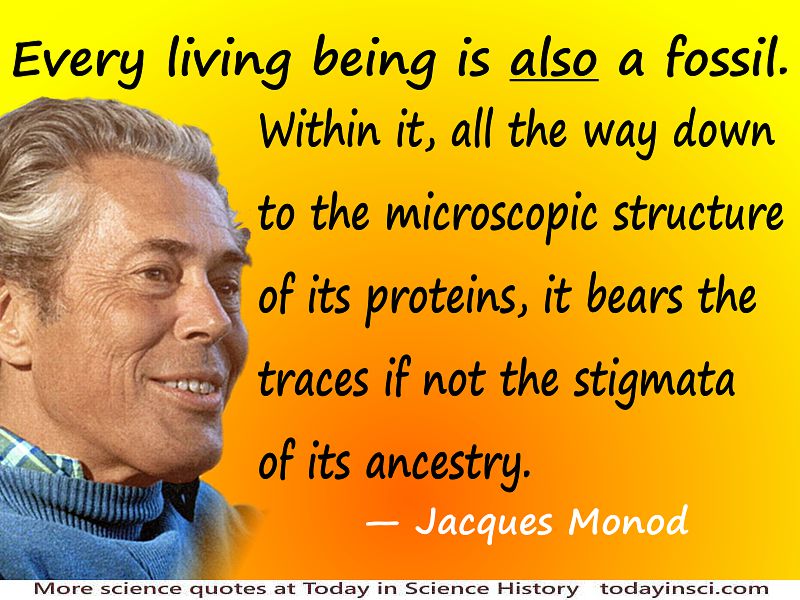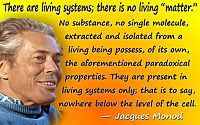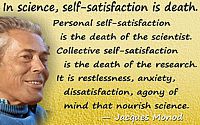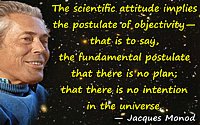 (source)
(source)
|
Jacques Monod
(9 Feb 1910 - 31 May 1976)
French biochemist who shared with his fellow researchers the 1965 Nobel Prize for Physiology or Medicine. They revealed how messenger ribonucleic acid (mRNA) is involved in protein synthesis within a cell. He headed the Pasteur Institute from 1971.
|
Jacques Monod - “Every living being is also a fossil.”
Illustrated Quote - Large (800 x 600 px)
More Jacques Monod quotes on science >>
Context of Jacques Monod's quote, “Every living being is also a fossil.”
The quote in English is a translation (by Austryn Wainhouse) from the original French (1970) written by Jacques Monod in his book, Chance and Necessity: An Essay on the Natural Philosophy of Modern Biology.1 Monod lays out his interpretation of the role of pure chance in the progress of evolution. He laid an emphasis on a fundamental underlying uniformity among living beings, with life processes based on molecular biology. Thus, in the case of any given life-form, what it is, and how it behaves, is inevitably the consequence of the whole of its ancestral development:
“Every living being is also a fossil. Within it, all the way down to the microscopic structure of its proteins, it bears the traces if not the stigmata of its ancestry. This is yet truer of man than of any other animal species by dint of the dual evolution—physical and ideational—that he is heir to.”
Whereas modern man's present form goes back about two million years, and can be traced further back along the hominid family tree, say, up to 20 million years more, man still carries an inheritance from the first origin of life two thousand million years ago.
Monot concluded his book with this summary2:
“Man at last knows that he is alone in the unfeeling immensity of the universe, out of which he emerged only by chance. Neither his destiny nor his duty have been written down. The kingdom above or the darkness below: it is for him to choose.”
2 ibid. 180.
- Science Quotes by Jacques Monod.
- 9 Feb - short biography, births, deaths and events on date of Monod's birth.
- Jacques Monod - context of quote “Every living being is also a fossil.” - Medium image (500 x 350 px)
- Jacques Monod - context of quote “There are living systems; there is no living “matter.”” - Medium image (500 x 350 px)
- Jacques Monod - context of quote “There are living systems; there is no living “matter.”” - Large image (800 x 600 px)
- Jacques Monod - context of quote “There is no intention in the universe” - Medium image (500 x 350 px)
- Jacques Monod - context of quote “There is no intention in the universe” - Large image (800 x 600 px)
- Jacques Monod - context of quote “In science, self-satisfaction is death.” - Medium image (500 x 350 px)
- Jacques Monod - context of quote “In science, self-satisfaction is death.” - Large image (800 x 600 px)
- Origins of Molecular Biology: A Tribute to Jacques Monod, by Agnes Ullmann (ed.). - book suggestion.









